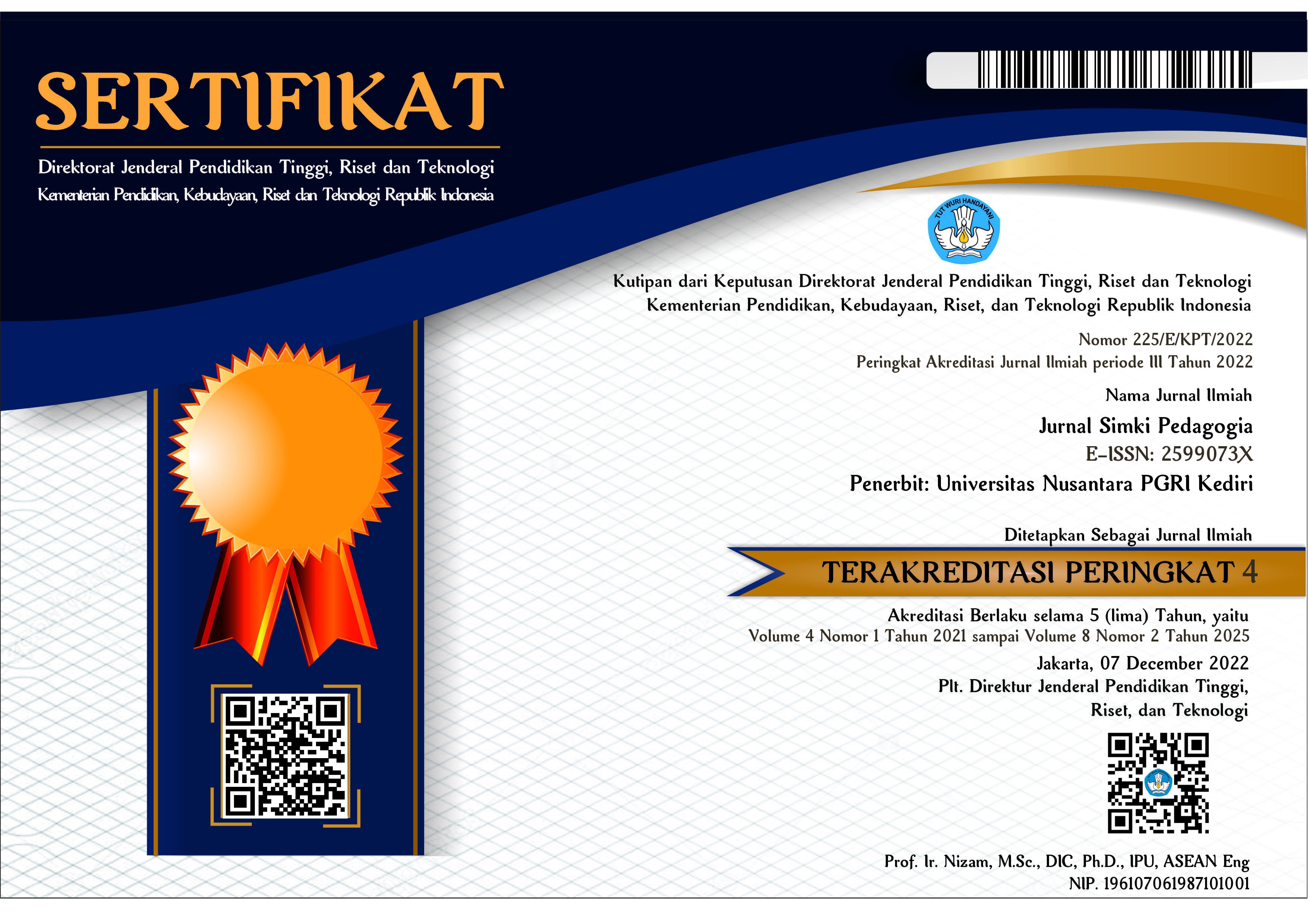Persepsi dan Pengalaman Mahasiswa Menggunakan Gamifikasi untuk Meningkatkan Motivasi dan Keterampilan Bahasa Inggris di Era Digital
 Abstract views: 759
,
Abstract views: 759
,
 PDF (Bahasa Indonesia) downloads: 1077
PDF (Bahasa Indonesia) downloads: 1077
Abstract
This study aims to explore students' perceptions and experiences in using gamification to improve their motivation and English skills in the digital era. The research method used is a qualitative approach with data collection through questionnaires in the form of open-ended and closed-ended questions. Diploma II Accommodation students at the Indonesian Hospitality Management Community Academy were the subjects of this study. The results of the study indicate that the use of gamification in learning English in the digital era has a positive impact on students' motivation and English skills. Based on data obtained from closed-ended questions, the majority of students showed a high level of agreement with the use of gamification in learning English. They feel more motivated, more confident, and more interested in speaking English. In addition, the results of the study indicate that gamification features help to better understand the material, the learning process is more enjoyable, increasing enthusiasm and interest in English learning materials, and also providing comprehensive insights into the effectiveness of learning English in the digital era. The results of this study can provide valuable contributions to the development of innovative and effective learning methods in improving students' motivation and English skills in the digital era.
Downloads
References
Afif, N. (2019). Pengajaran dan Pembelajaran di Era Digital. IQ (Ilmu Al-Qur’an): Jurnal Pendidikan Islam, 2(1), 117–129. https://doi.org/10.37542/iq.v2i01.28
Anisa, K. D., Marmanto, S., & Supriyadi, S. (2020). The effect of gamification on students’ motivation in learning English. Leksika: Jurnal Bahasa, Sastra Dan Pengajarannya, 14(1), 22–28. https://dx.doi.org/10.30595/lks.v14i1.5695
Caponetto, I., Earp, J., & Ott, M. (2014). Gamification and education: A literature review. European Conference on Games Based Learning, 50. https://archivioge.itd.cnr.it/download/gamificationECGBL2014.pdf
Chapman, J., & Rich, P. (2017). Identifying motivational styles in educational gamification. http://dx.doi.org/10.24251/HICSS.2017.157
Dichev, C., & Dicheva, D. (2017). Gamifying education: what is known, what is believed and what remains uncertain: a critical review. International Journal of Educational Technology in Higher Education, 14(1), 1–36. https://doi.org/10.1186/s41239-017-0042-5
Etika, E., Hidayati, U., & Ramadhan, D. G. (2021). Optimalisasi Pembelajaran Ekonomi Bisnis Berbasis Gamifikasi Untuk Meningkatkan Motivasi Mahasiswa. JEID: Journal of Educational Integration and Development, 1(2), 70–79. https://doi.org/10.55868/jeid.v1i2.87
Harmer, J. (2007). How to Teach English. Pearson Education Limited.
Julita, & Purnasari, P. D. (2022). Pemanfataan Teknologi sebagai Media Pembelajaran dalam Pendidikan Era Digital. Journal of Educational Learning and Innovation (ELIa), 2(2), 227–239. https://doi.org/10.46229/elia.v2i2.460
Jusuf, H. (2016). Penggunaan gamifikasi dalam proses pembelajaran. Jurnal TICom, 5(1), 1–6. https://ejurnal.net/portal/ticom/article/view/1666
Nikmah, H. (2020). Gamification to Improve Students’ Engagement in Learning English. Acitya Journal of Teaching and Education, 2(1), 60–70. https://dx.doi.org/10.30650/ajte.v2i1.277
Poondej, C., & Lerdpornkulrat, T. (2016). The development of gamified learning activities to increase student engagement in learning. Australian Educational Computing, 31(2). https://eric.ed.gov/?id=EJ1123845
Purbosari, P., & Sutrisno, T. (2021). Studi Korelasi Intensitas Menonton Youtube Terhadap Minat Belajar Mahapeserta didik PGSD Universitas Veteran Bangun Nusantara. Journal of Educational Learning and Innovation (ELIa), 1(2), 117–128. https://dx.doi.org/10.46229/elia.v1i2.252
Purnasari, P. D., & Sadewo, Y. D. (2021). Strategi Pembelajaran Pendidikan Dasar di Perbatasan Pada Era Digital. Jurnal Basicedu, 5(5), 3089–3100. https://doi.org/10.31004/basicedu.v5i5.1218
Purwadhi, P. (2019). Pembelajaran Inovatif dalam Pembentukan Karakter Peserta didik. Mimbar Pendidikan, 4(1), 21–34. https://doi.org/10.2121/mp.v4i1.1117
Puspita, E. I., Rustini, T., & Dewi, D. A. (2021). Rancang Bangun Media E-book Flipbook Interaktif pada Materi Interaksi Manusia dengan Lingkungannya Sekolah Dasar. Journal of Educational Learning and Innovation (ELIa), 1(2), 65–84. https://doi.org/10.46229/elia.v1i2.307
Putra, P. P., & Priyatmojo, A. S. (2021). Students’ perception toward gamification applied in the English language classroom. ELT Forum: Journal of English Language Teaching, 10(1), 21–29. http://dx.doi.org/10.15294/elt.v10i1.40558
Rahardja, U., Aini, Q., & Khoirunisa, A. (2019). Implementasi gamifikasi sebagai manajemen pendidikan untuk motivasi pembelajaran. Edutech, 18(1), 67–79. https://doi.org/10.17509/e.v18i1.14697
Rijal, F., & Idris, T. (2020). Teachers’ Pedagogic Competence in Utilizing Learning Media of Islamic Religious Education at State Junior High Schools in Lhoksuemawe. Cendekia: Jurnal Kependidikan Dan Kemasyarakatan, 18(1), 101–116. http://dx.doi.org/10.21154/cendekia.v1i1.1818
Sulistyarini, W., & Fatonah, S. (2022). Pengaruh Pemahaman Literasi Digital dan Pemanfaatan Media Pembelajaran terhadap Kompetensi Pedagogik Guru Era Digital Learning. Journal of Educational Learning and Innovation (ELIa), 2(1), 42–72. https://doi.org/10.46229/elia.v2i1.383
Toimah, T. F., Maulana, Y. I., & Fajar, I. (2021). Gamification model framework and its use in e-learning in higher education. IAIC Transactions on Sustainable Digital Innovation (ITSDI), 3(1), 28–35. https://dx.doi.org/10.34306/itsdi.v3i1.520
Copyright (c) 2024 Ni Putu Dianita Safitri, Nirmala Tari

This work is licensed under a Creative Commons Attribution 4.0 International License.

Jurnal Simki Pedagogia : https://jiped.org/index.php/JSP/index is licensed under a Creative Commons Attribution 4.0 International License.
















